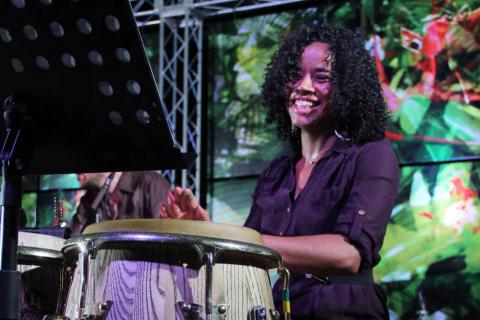
Negah Santos
Brazilian hand-percussionist Negah Santos came to the Berklee Global Jazz Institute with dual interests: drumming and social work—passions born of her upbringing in São Paulo, Brazil. Within the BGJI, she strives to further intertwine her playing and social activism.
Santos, who plans to graduate this spring with a degree in performance, looks forward to improving the lives of young musicians via her masterful rhythms.
How did you get into percussion?
When I was 15, my mom wanted me to do dance classes so she put me in this [community music program] in São Paulo, Brazil—Meninos do Morumbi. The percussion class was next door to the dance class so when she left, I changed rooms. Once I heard that first rhythm I knew I wanted to play.
How did you find out about the Berklee Global Jazz Institute?
In the social project [community music program], I gained a basic knowledge of Brazilian rhythms but I wanted to study more. I was becoming curious about other cultures and types of music. I found that the only free school for music in São Paulo was a school called Centro Estudos Musicais Tom Jobim. So I went there and started meeting famous musicians who were also teachers and this bass player—Zuzo Moussawer—told me about Berklee College of Music. He used to teach at Conservatório Musical Souza Lima.
So when I came to Berklee, I met and jammed with some students in the BGJI. A lot of my friends ended up being BGJI students and they introduced me to it.
I got interested in the program because of the social work they were doing. This was something that I was missing. I found music that way. I realized social work was a big part of me and I wanted to be part of the BGJI for that reason.
Why is social work important to you?
That’s how it happened to me. I had help. I felt that I needed to do something. Music was presented to me in such a beautiful way, as something that could change your reality. I saw people dying in the social project but I also saw people doing well. It wasn’t only about music—they also go to college and have their own families. They moved out of the poor neighborhoods and music put them on that track.
Describe your BGJI experience.
It’s a commitment. In the beginning, it was hard for me to commit completely and understand why it’s important. I had to free myself to commit.
Also, I wanted to learn jazz but it was hard for me, being a hand-percussionist. BGJI opened my mind. Now I understand what my role is inside of jazz.
Talk a little bit about the trips BGJI students take. Most recently, you visited Panama City, Panama. What did you do while you were there?
We gave some individual and ensemble clinics, and played the Panama Jazz Festival. There was great sense of community in Panama City. Everyone came together to make the festival happen and display their culture. They were really proud of what they were doing. It was beautiful.
What do you want to do after Berklee?
I just want to keep playing. I also want to work with kids because they’re our future.
During a BGJI trip to the Dominican Republic I met these little girls. They were playing percussion on trash cans. They were amazing and I could see, in their eyes, that they had bright futures but they needed someone to guide them. If I’d had the money to travel, I would’ve liked to stay over there for a few months just to give a little bit of myself.